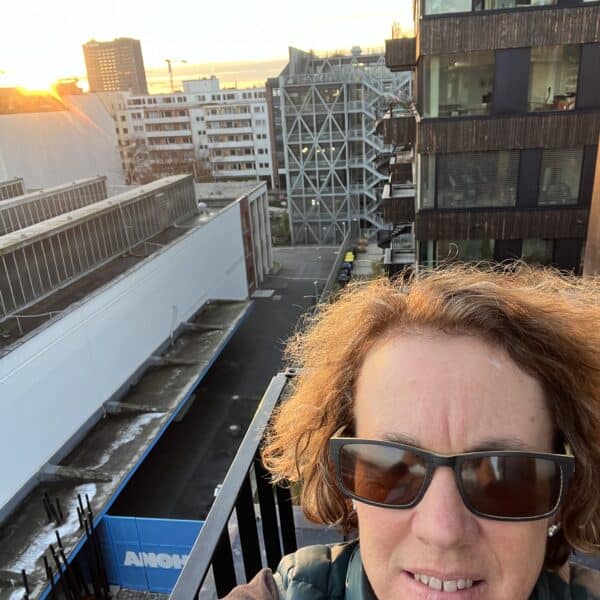story & photos by Tricia Dewey
(Photo above: Mid-South Immigration Advocates staff (L-R) Christy M. Swatzell, Asylum Initiative Director; Luis E. Melean, Asylum Initiative Coordinator; and Sally M. Joyner, Interim Executive Director. The group helps adults seeking asylum as well as a large number of minors who are in the United States alone.)
Immigration stories have made headlines for the past few years. The zero-tolerance policy that caused family separations actually began in summer 2017, led to nearly 5,500 children being separated from their families and housed in extreme and harsh conditions. In early December 2019, a 16-year-old boy, diagnosed with flu and found dead later in his concrete cell at a Border Patrol facility, became the sixth child to die in custody in less than a year. In Memphis, Manuel Duran, a journalist originally from El Salvador, was arrested in April 2018 and detained for more than 15 months. His story made national news. There has been increased U.S. Immigration and Customs Enforcement (ICE) activity in Memphis and there is continued potential for a mass raid.
According to the latest estimates from the Migration Policy Institute, there are 26,000 undocumented immigrants in Shelby County and 4,000 of those are school-age kids. Organizations in Memphis like Latino Memphis and Las Americas are working to help the increasing number of immigrants. Mariposas Collective provides food and clothing for asylum seekers traveling through the Memphis Greyhound bus station. More than half of the cases taken by the Community Legal Center (CLC) are immigration cases and 80% of those involve women and children fleeing domestic violence, human trafficking, and other forms of gender-based violence. Many of the other nonprofits in this arena work together to provide education and legal services to immigrants.
In 2013, Mid-South Immigration Advocates (MIA), another nonprofit law firm, was founded to focus on the growing need of immigration representation. With a staff of 10 including four attorneys, MIA provides services to low-income families and children for no fee. They also represent victims of domestic violence in partnership with CasaLuz, which helps victims to know and exercise their legal rights. MIA clients include children requesting asylum or Special Immigrant Juvenile Status, but funding for those cases was completely cut in 2018 so that numbers of these cases have declined.
In summer 2018, MIA learned that the Southern Border had moved to Memphis’ own backyard when family members and other lawyers reported that detainees were detained at the Tallahatchie County Correctional Facility in Tallahatchie, Mississippi, a maximum-security facility funded by CoreCivic. Originally these men enter the United States at the Southern Border and follow U.S. laws to claim asylum. While in shackles they are then flown to Memphis and bused 90 miles away to Tallahatchie to await their “credible fear” interview, a first step in their asylum case. The men don’t understand why they’re imprisoned and are not even sure where they are. Many arrive with their families and now don’t know the location of their children or wives.
At the request of DOJ, MIA’s Asylum Initiative has begun to deliver “Know Your Rights” sessions to these detainees, driving the 90-mile route to Tallahatchie to see on average between 800 and 1100 people a month. The detainees are from many different countries including India, Russia, Georgia, Africa, The Caribbean, Venezuela, Brazil, China, and Armenia. MIA presents information in Spanish and English and amazing volunteers help with other languages. The “credible fear” interview establishes whether a believable fear of persecution or torture exists if an asylum seeker is returned to his home country. If he passes the interview, which new policies have made much more difficult, he is transferred to a facility in Louisiana and further detained, sometimes for months or years before seeing a judge. If he does not pass the interview, he is transferred to another detention center for deportation.
The process in Tallahatchie is part of a new model for processing asylum seekers, moving them to one designated facility that houses between 1100 and 1500 asylum seekers while they have interviews over the phone. CoreCivic gets paid per bed and is one of the for-profit prisons companies making money on increased immigrant detention.
Luis Melean, Asylum Initiative Coordinator, says that the Asylum Initiative is a positive connection for the men. Prior to involvement by MIA they received little to no legal advice. MIA does a good job of getting the men to trust them and they’re grateful for the information they get. “They have a purpose. We remind them why they’re doing this and that they’re not alone.”
The staff at MIA is incredibly dedicated and finds meaning in the challenging legal work they do. Their current case load is overflowing and they are searching for additional funding to better serve their clients. Sally Joyner, MIA interim director, describes not helping these groups as short-sighted. “These are our neighbors, people who run our favorite restaurants, remodel our homes, whose kids go to school with our kids.” Eventually she says they will have green cards, pay taxes, and vote; these services are needed for the invisible among us who will eventually be seen.
For more information, visit miamemphis.org.




